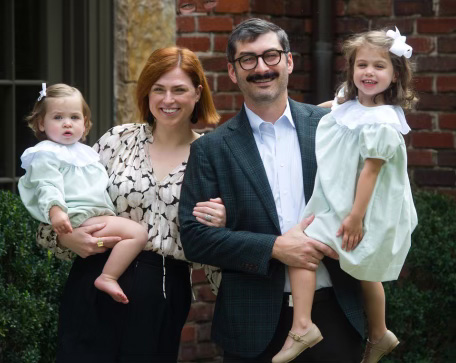When Chelsey LaRussa Heslop was just five years old, she received a Type 1 diabetes diagnosis. Her entire family–the LaRussa family–was taken by surprise but met the diagnosis head on.
“As a child, my parents were with me every step of the way but also gradually let me be more independent in my diabetes management the older that I got,” said Heslop. “Now as a parent, I understand the stress of sitting on the sidelines at a sports game and watching your child with diabetes compete while you worry about their blood sugar.”
sitting on the sidelines at a sports game and watching your child with diabetes compete while you worry about their blood sugar.”
As Chelsey grew up and continued to learn how to manage her diabetes, she and her dad Benny decided they wanted to do more. They hit the ground running for diabetes research, raising funds for the Juvenile Diabetes Research Foundation (JDRF)–an organization that supports diabetes research, clinical trials, and advocacy–across the world.
Eventually, their efforts were doubled when they joined forces with another duo raising funds for diabetes in Birmingham: local philanthropist David Silverstein and his daughter Sarah Silverstein Mackintosh, who also has Type 1 diabetes and was around the same age as Chelsey.
The LaRussa and Silverstein families then partnered over the next several years to continue fundraising for the JDRF. They also began to make a big ask of UAB: to start a world-renowned diabetes center in the heart of Alabama, and subsequently the diabetes belt.
Their fundraising and persuasion efforts, combined with institutional and state-wide support, eventually helped to kickstart what became the UAB Comprehensive Diabetes Center in 2008.
Over the next several years, Chelsey continued to support organizations that valued diabetes advocacy and research. The summer of her senior year at Birmingham Southern College, she even landed an advocacy internship with the JDRF in Washington, D.C.
It was there that Chelsey met her now husband, Kyle Heslop, who also has Type 1 diabetes. Unlike Chelsey’s early childhood diagnosis, Kyle was diagnosed with Type 1 diabetes at the age of 18.
“Although it’s not a disease that I wish on anyone, I really am so grateful that diabetes brought Kyle and me together,” said Chelsey. “Since Kyle was from the Midwest, we might not have ever met without interning for the JDRF.”
Though Kyle and Chelsey had to do long distance for a bit, he was accepted into the Cumberland School of Law in Birmingham. They got married in the fall of 2015, and since then, have welcomed two daughters.
 Now, Kyle and Chesley are raising their daughters in Birmingham, the city that Chesley grew up in and has a passion for giving back to. And both say that having a partner that also has diabetes has its pros.
Now, Kyle and Chesley are raising their daughters in Birmingham, the city that Chesley grew up in and has a passion for giving back to. And both say that having a partner that also has diabetes has its pros.
“Thankfully, it’s not overwhelming being married to someone who also has Type 1 diabetes,” said Chelsey. “In fact, it’s comforting to have a partner who understands and who can take the kids when we go low, for instance. It puts into perspective how important it is to take care of ourselves. We want each other to stick around for a long time so we take care of ourselves and take care of each other.”
The Heslops both use closed-loop systems to manage their diabetes, meaning that their blood sugar monitoring device can “talk” directly to their insulin pump to signal how much insulin it should release and when. They say it is not a perfect system, such as when exercise is involved, but it relieves a lot of the mental load of managing diabetes.
Diabetes management without an insulin pump or a glucose monitor can look like several finger pricks and testing strips each day. The Heslops want to expand access to diabetes technology.
“We recognize how lucky we are to use diabetes technology, and we really want to advocate for expanding the access to diabetes healthcare providers as well as to technology options for others with diabetes,” said Kyle.
Kyle has a passion for expanding access to healthcare. In fact, Kyle is a public finance and transactional lawyer at Maynard Nexsen. His practice focuses on financings for health care systems, academic medical centers and hospitals across the country, and in particular across Alabama. He says it incredibly rewarding to help hospitals in his work, particularly in rural areas. Having a hospital nearby can mean life or death for those experiencing diabetic ketoacidosis, heart attack, or other life-threatening complications.
Access to better treatment options for diabetes is more important now than ever before as the prevalence of diabetes, particularly in the South, continues to increase. In fact, the Centers for Disease Control and Prevention notes that the number of Americans with Type 1 diabetes is up nearly 30% from 2017.
“I hear more and more from parents with children who are diagnosed with Type 1 diabetes,” said Chelsey. “My family really has at heart to help those with diabetes live as close to a normal life as possible. Anything we can do to further research, the better.”
The Heslops say they are glad to support resources like the UAB Comprehensive Diabetes Center, which is working toward improving treatment options for diabetes, right in their own back yard.
“In my mind, it makes sense that a cutting-edge diabetes center is right here in Birmingham, AL, since the South is so affected by diabetes,” said Kyle. “The center gives visibility to the disease, and it gives legitimacy to the research being done there. The UCDC continues to impress me with wide breadth of research and intelligent researchers they attract from all over the world for new discoveries, management, and treatment solutions for diabetes.”
-- Written by Emma Shepard, April 2024


